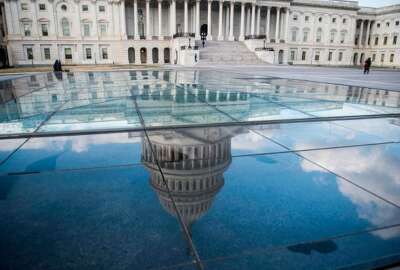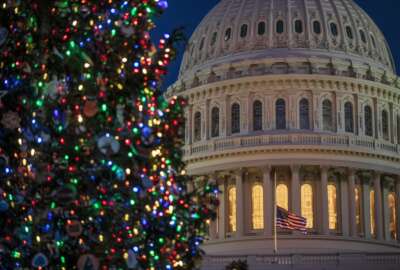

The U.S. Coast Guard said its military members won't receive their regularly scheduled paychecks at the end of the month unless Congress passes appropriations or a...
Update to the story below: Late on Dec. 28, the Coast Guard said it had found a way to pay its military members on Dec. 31 after all. Details here.
As the partial government shutdown will stretch into next week, most federal employees should still receive their regularly scheduled paychecks this Friday or this weekend.
But some 42,000 military personnel at the U.S. Coast Guard won’t have the same luck.
Though the partial shutdown largely doesn’t impact the Defense Department and members of the military in the Army, Navy, Air Force and Marines, the same isn’t true for the U.S. Coast Guard, a Department of Homeland Security subcomponent that lacks full-year 2019 appropriations.
Military members are paid under a different schedule than civilian employees. The most recent pay period for the military started on Dec. 16 and runs through Dec. 31. Again, most military members will continue to receive their next paychecks on the Dec. 31.
But if Congress doesn’t pass some sort of appropriations bill or funding deal by Friday, Dec. 28, military members in the Coast Guard won’t receive their regularly scheduled pay on Monday, Dec. 31, a USCG spokesman confirmed Thursday to Federal News Network.
Without a deal by Friday, the Coast Guard’s military workforce won’t receive pay until Congress passes appropriations or a continuing resolution — even for the days that its uniformed personnel worked prior to the Dec. 22 partial shutdown.
And it appeared Thursday that Congress wouldn’t, in fact, come to an agreement on funding by Friday. President Donald Trump has vowed to hold the line on his demands for funding for a border wall, and congressional leaders aren’t speaking about a potential compromise or agreement. Both the House and Senate have adjourned until Monday.
The Coast Guard spokesman said this situation also applies to the commissioned officers within the National Oceanic and Atmospheric Administration, where the USCG Pay and Personnel Center also provides services. But it doesn’t apply to officers within the U.S. Public Health Service, another USCG payroll client, because the PHS already received appropriations for 2019.
Coast Guard retirees and annuitants should not see any interruption in their pay. USCG has identified personnel who will continue to work through the partial shutdown and will administer retiree and annuitant payroll on time near Dec. 31, according to a statement on the service’s pay and personnel center website.
The situation is different for most other civilian employees who work at agencies impacted by the partial government shutdown.
The most recent pay period ran from Dec. 9 through Dec. 22 for most civilian employees. Employees on this schedule should receive their paychecks for this last biweekly pay period on time, or somewhere in between Dec. 28 and Jan. 3, according to OPM.
Timekeeping for this pay period would usually occur between Dec. 24 and Dec. 26, and payroll providers were encouraged to finalize and process paychecks for the Dec. 9-22 pay period as an orderly shutdown activity, according to OPM guidance.
But employees who worked on Saturday — the first day of the partial shutdown and last day of the most recent pay period — may not see pay for Dec. 22 included in this paycheck, OPM said.
The status of the next paycheck — for the pay period running from Dec. 23 through Jan. 5 — is more complicated. The longer the partial shutdown continues, the more likely the next paycheck will get delayed.
Excepted employees working during the partial shutdown can’t and won’t get paid until after the lapse in appropriations ends. OPM has reminded agencies they should document any work that employees have performed during the partial shutdown, so they can quickly get paid for that time whenever the lapse ends.
It’s ultimately up to Congress to decide if it wants to pay non-excepted employees for time spent furloughed. Lawmakers in recent history have, however, passed such legislation, and they likely will again during this partial shutdown.
The Senate has already done its part. It passed under unanimous consent legislation that would guarantee back pay for furloughed federal employees. The House hasn’t yet taken up this legislation.
Meanwhile, federal employee organizations have said their members are actively worried about the impacts the lapse in appropriations will have on their finances.
Members at the National Treasury Employees Union are “gravely concerned” about their finances now that they’re furloughed or still working with guarantee they’ll receive their next scheduled paycheck on time, NTEU National President Tony Reardon wrote Thursday in a letter to the Office of Management and Budget and Office of Personnel Management.
“Beyond the immediate financial implications and worry over missed mortgage and rent payments, I am also hearing from frontline employees who are now saddled with credit cards payments for official government purchases for equipment, goods and services, but, which under agency procedures, are billed directly to individuals and which must continue to be paid on time,” Reardon said.
The federal government’s four main payroll providers can work during the partial shutdown, even if their home agencies lack full-year appropriations and otherwise have large portions of furloughed employees.
The Agriculture Department’s National Finance Center, the Interior Department’s Business Center and General Services Administration’s Payroll Services Branch all receive funding on a cost-reimbursement basis, not annual appropriations.
The National Finance Center, which is housed within the Agriculture Department, has staff working or on call to handle the needs of their clients, many of which are still open and not impacted by the partial shutdown.
The Defense Finance and Accounting Service (DFAS) handles payment services for the Pentagon, which isn’t impacted by this partial shutdown.
NTEU is also encouraging the administration to communicate with payroll providers to make sure they’re prepared to immediately process delayed paychecks whenever funding is restored.
“In past shutdowns, administrations have directed payroll providers to act to provide delayed funds immediately following a lapse in appropriations,” Reardon said in the letter, which and I ask that in your respective roles you ensure that paychecks can be delivered as soon as possible.
During previous shutdowns in 1995-1996 and again in 2013, OPM provided employees with letters they could give to creditors to confirm the shutdown and its impact on their pay.
OPM on Thursday provided similar samples, which employees can use as a guide when working with creditors during the furlough. You can access those letters here.
Copyright © 2025 Federal News Network. All rights reserved. This website is not intended for users located within the European Economic Area.
Nicole Ogrysko is a reporter for Federal News Network focusing on the federal workforce and federal pay and benefits.
Follow @nogryskoWFED


